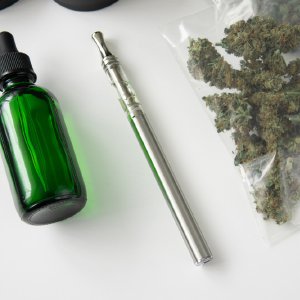Cannabis DOESN’T Cure Cancer

No, cannabis can’t cure cancer. Here in Oklahoma, we have a vote coming up that will determine the will of the people to allow medical cannabis or reject medical cannabis in the State of Oklahoma. Narconon Arrowhead is a non-profit that wants to teach the public the truth about drugs and ensure that people aren’t lead astray by profiteers looking to make a buck with shady advertising and biased articles that convince readers that cannabis is a miracle drug that has the ability to cure cancer, and much more. That said, this article shouldn’t be misconstrued—we aren’t here to take a political stance on SQ788.
What Cannabis Cannot Do
According to the American Cancer Society,
Relying on marijuana alone as a treatment while avoiding or delaying conventional medical care for cancer may have serious health consequences. There have been early clinical trials of cannabinoids for the treatment of cancer in humans and more studies are planned. While the studies so far have shown that cannabinoids can be safe in treating cancer, they do not show that they help control or cure the disease.
What Cannabis Can Do
Again, according to the American Cancer Society,
Scientists reported that THC and other cannabinoids such as CBD slow the growth and/or cause death in certain types of cancer cells grown in lab dishes. Some animal studies also suggest certain cannabinoids may slow growth and reduce the spread of some forms of cancer, but that isn’t a “cure” and again, avoiding or delaying conventional medical care for cancer may have adverse health consequences.
Health Risks of Consuming Cannabis
The National Institute on Drug Abuse has this to say about cannabis—THC acts on specific brain cell receptors that ordinarily react to natural THC-like chemicals. These natural chemicals play a role in normal brain development and function.
Marijuana over-activates parts of the brain that contain the highest number of these receptors. This causes the "high" that people feel. Other effects include:
- altered senses (for example, seeing brighter colors)
- altered sense of time
- changes in mood
- impaired body movement
- a difficulty with thinking and problem-solving
- impaired memory
- hallucinations (when taken in high doses)
- delusions (when taken in high doses)
- psychosis (when taken in high doses)
The biggest health challenge with cannabis is the effect that it has on the brain’s development. The earlier in life that you consume cannabis the greater impact that it will have on your brain development.
Risk of Death
Although no one is overdosing on cannabis, that doesn’t mean the herb is without health risks or that consuming it doesn’t have effects that can result in death. A new study published in the European Journal of Preventive Cardiology concluded that marijuana use is associated with a threefold risk of death from hypertension as stated by Barbara A. Yankey, study lead author, and Ph.D. student in the School of Public Health at Georgia State University, in a press statement:
“This is not surprising since marijuana is known to have a number of effects on the cardiovascular system. Marijuana stimulates the sympathetic nervous system, leading to increases in heart rate, blood pressure, and oxygen demand,”
According to another study, smoking marijuana is a rare trigger of acute myocardial infarction. Therefore, potential high-risk populations may wish to refrain from cannabis inhalation because of these concerns. Should cannabis trigger a heart attack they won’t list cannabis as the cause of death.
Sources:
- https://www.cancer.org/treatment/treatments-and-side-effects/complementary-and-alternative-medicine/marijuana-and-cancer.html
- https://www.drugabuse.gov/publications/drugfacts/marijuana
- https://www.healthline.com/health-news/study-on-marijuana-and-heart-health-stirs-debate#3
- https://okpolicy.org/sq-788-compare-states-medical-marijuana-laws/


